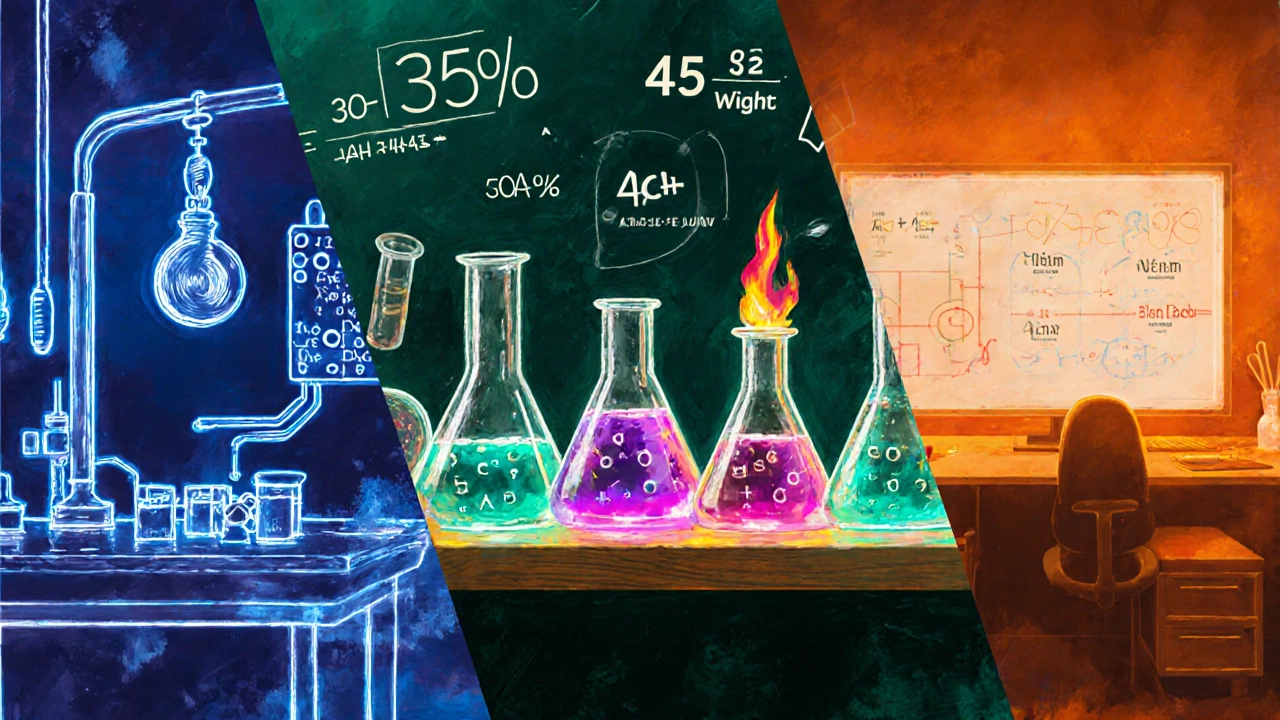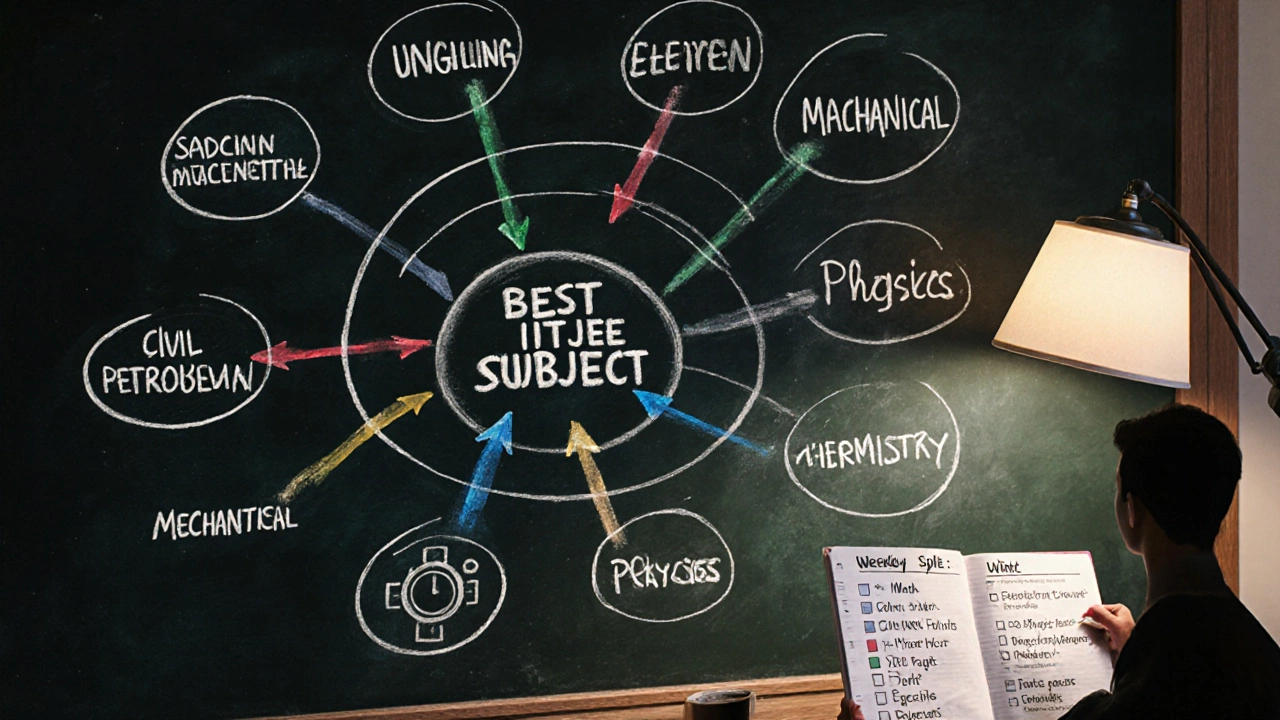
JEE Subject Selector Tool
Your Profile
Key Metrics
Enter your details above and click 'Calculate Best Subject' to see personalized recommendations.
When you stare at the JEE syllabus and wonder which subject will give you the biggest edge, the answer isn’t a magic shortcut - it’s a mix of scores, career goals, and personal strengths. Below you’ll find a straight‑forward way to figure out the best IIT subject for you, plus real‑world data on how Physics, Chemistry and Mathematics perform in the exam and what branches they open up.
What makes a subject “best” for JEE?
Before we rank anything, let’s set the criteria that matter to most aspirants:
- Scoring potential. How high can you realistically score in the subject compared to the overall average?
- Weight in the exam. JEE Main and JEE Advanced allocate marks differently across subjects.
- Difficulty curve. Some students breeze through concepts, others need extra time.
- Career alignment. Certain branches (e.g., Computer Science) lean heavily on Mathematics, while Civil Engineering draws from Physics.
- Personal interest. Long‑term motivation often trumps raw difficulty.
Match your profile against these points, and the “best” subject becomes clearer.
Physics - the concept‑heavy contender
Physics challenges you with dynamics, electromagnetism, optics and modern physics. In JEE Main, Physics contributes roughly 30% of total marks, while JEE Advanced can push it up to 35%.
Scoring data from 2023‑2024 shows the average Physics score sits at 42out of 84, slightly below the Mathematics average of 45. However, top‑scoring students often pull a 70+ in Physics because the subject rewards deep problem‑solving more than rote memorisation.
Career pathways linked to Physics include Mechanical Engineering, Aerospace, and Materials Science. If you picture yourself designing engines or working on satellite payloads, Physics is the natural springboard.
Common pitfalls: skipping the fundamentals (Newton’s laws, basic circuit theory) and trying to cram advanced concepts without a solid base. A good rule of thumb is to master every NCERT example before moving to reference books.
Chemistry - the balancing act
Chemistry blends physical concepts with organic reactions and inorganic structures. It accounts for about 30% of JEE Main marks and roughly 30‑32% in JEE Advanced.
Historically, Chemistry has the highest average score - around 45 out of 84 - making it a “safety net” for many aspirants. The reason? Well‑written NCERT chapters and clear logical flow keep many students steady.
Engineering branches that rely heavily on Chemistry include Chemical Engineering, Biotechnology, and Petroleum Engineering. Even if you aim for Computer Science, a solid Chemistry score can boost your overall rank.
Key traps: ignoring the reaction mechanisms in Organic Chemistry and treating Inorganic tables as memorisation chores. Instead, create mind‑maps that link periodic trends to real‑world applications (e.g., catalyst design).

Mathematics - the high‑scoring engine
Mathematics covers calculus, algebra, vectors, and coordinate geometry. It typically carries the highest weight - about 40% of total marks in JEE Main and up to 45% in JEE Advanced.
Average scores hover around 45‑48 out of 84, and the top 1% of candidates often achieve 70+ marks. The subject’s scoring power comes from the fact that a single well‑solved problem can fetch 6marks, whereas Physics or Chemistry questions may split points across multiple steps.
If you aspire to Computer Science, Electrical, or any branch heavy on algorithms, Mathematics is the core prerequisite. Even branches like Civil Engineering benefit from strong Vector and Trigonometry skills.
Typical errors: over‑reliance on shortcuts without understanding underlying theorems, and neglecting practice of long‑answer questions that test step‑by‑step reasoning. Consistent problem‑sets from past JEE papers are indispensable.
Quick side‑by‑side comparison
| Metric | Physics | Chemistry | Mathematics |
|---|---|---|---|
| Average Score (2024) | 42 / 84 | 45 / 84 | 47 / 84 |
| Weight in JEE Main | 30% | 30% | 40% |
| Weight in JEE Advanced | 35% | 31% | 44% |
| Top‑scorer range | 70‑80marks | 68‑78marks | 72‑84marks |
| Primary career links | Mechanical, Aerospace, Materials | Chemical, Bio‑Tech, Petroleum | Computer Science, Electrical, Civil |
| Typical difficulty | High conceptual depth | Moderate, systematic | High problem‑solving intensity |
Match the subject to your engineering dream
Think of your target branch as a map. Here’s a quick guide:
- Computer Science / Information Technology: Mathematics is non‑negotiable. Aim for a Math score above 70marks.
- Electrical / Electronics: Strong Math plus Physics (especially electromagnetism) helps you stand out.
- Mechanical / Aerospace: Physics carries weight; a solid 65+ in Physics boosts your profile.
- Civil Engineering: Physics (statics, dynamics) and Mathematics (vectors) are key.
- Chemical / Petroleum: Chemistry becomes a decisive factor; a 68+ in Chemistry can tip the scales.
Use this matrix to prioritize study time. If you’re eyeing Computer Science, allocate 45% of your weekly hours to Mathematics, 30% to Physics and the remaining 25% to Chemistry for balance.

Practical checklist for picking your “best” subject
- Take a diagnostic mock that covers all three subjects.
- Identify which section gave you the highest raw score and which drained your time.
- Rank your career preference list - note the subjects each branch leans on.
- Match your diagnostic strengths with branch requirements.
- Finalize a study‑hour split that reflects both your strengths and your target branch.
Example: If your mock shows 78marks in Chemistry, 62 in Physics, and 55 in Mathematics, and you want to become a Chemical Engineer, you’d keep Chemistry as the “anchor” subject and boost Mathematics to at least 60marks for overall rank safety.
Study tips that work across subjects
- Stick to NCERT first. Every JEE question can be traced back to an NCERT line.
- Practice with past papers. Solve at least two full‑length JEE papers per month.
- Use spaced repetition. Flashcards for formulas (Physics) or reaction mechanisms (Chemistry) keep info fresh.
- Teach a friend. Explaining a concept forces you to fill gaps.
- Analyse mistakes. Log every wrong answer, categorize the error type, and revisit the concept.
Frequently Asked Questions
Which JEE subject should I focus on if I want a high overall rank?
Mathematics carries the highest weight and offers the biggest scoring jumps. If you can secure 70+ marks in Math, your overall rank improves significantly, regardless of the other two subjects.
Is Chemistry really a “safety net” for JEE?
Statistically, Chemistry has the highest average score across years, thanks to its systematic presentation in NCERT. It can buffer a lower Physics or Math score, but don’t rely on it alone for a top rank.
Can I excel in JEE without being strong in Physics?
Yes, especially if you aim for branches like Computer Science or Chemical Engineering, where Mathematics and Chemistry weigh more. However, a minimum of 55marks in Physics is usually needed to stay competitive.
How many hours per week should I allocate to each JEE subject?
A common split is 45% Math, 30% Physics, 25% Chemistry for CS/IT aspirants; reverse the ratio for Chemical or Mechanical streams. Adjust based on mock performance.
Where can I find reliable JEE mock tests?
Official NTA mock portals, reputable coaching websites, and the past‑year papers released by the JEE committee are the most accurate reflections of the exam pattern.





